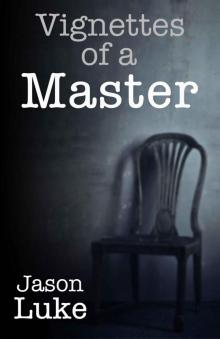- Home
- Jason Luke
The Light House Page 2
The Light House Read online
Page 2
The painting was oil on canvas set within a simple silver frame. Connie went towards the wall, overcome with a sense of reverence. She caressed the frame with the tips of her fingers as if to feel what the artist had felt – as if to connect herself with this wondrous thing of beauty.
She had felt this same profound reaction to a painting only once before in her life. On a month-long vacation in Europe to celebrate her twenty-fifth birthday she had found herself in a gallery. Standing before Vermeer’s ‘Woman in Blue Reading a Letter’ at the Rijksmuseum, she had wept behind the red velvet rope, for she had never seen a painting that seemed to evoke and capture the sense of timeless sorrow and suffering of every woman who had ever known love.
That moment in Amsterdam had inspired her passion for art and set the course for her future. Now this little painting hanging in a craft gallery on the rugged coast of Maine spoke to her in the same mesmerizing way.
Connie sniffed back tears of deep emotion and wonder. She peered hard at the painting for long fascinated minutes. Every brush stroke was flawless, capturing the movement of the waves, the solitude of the sea, the looming menace of the sky. But it was the girl in the foreground that her eyes kept being drawn back to. She had long dark hair, whipped by the wind, and she was wearing a simple gown that hung to her feet. There was something beseeching in the way the artist had captured the girl – an ethereal quality that transcended mere paint to empower her.
On a reckless impulse, Connie snatched the painting off the wall. She turned the canvas over. It was unsigned. There was nothing on the back of the painting and somehow she felt cheated and disbelieving. She carried the painting to a light on the wall and peered closely at the edges. There was no mark, no signature. She felt the air escape her in a desperate sigh of disappointment.
Yet she was trembling, filled with a growing sense of incredulity. A swirl of superstitious nausea washed through Connie as she stared hard at the painting. She felt a preternatural chill turn her blood to ice. She began to shake with dawning realization of what this was – of who had crafted this masterpiece, and the thrill of that was an incredulous tingle of disbelief and giddy joy.
She tucked the painting under her arm and thrust her hand deep into her bag – then remembered she no longer had her phone. She went quickly to the glass counter. There was a phone on the wall. Connie snatched it up and realized her hands were shaking.
Suddenly the door behind the counter swung violently open and a middle-aged woman came into the gallery. There was a look of horror and alarm on her face. She glared at Connie and her mouth gaped open.
“What are you doing?” the woman rasped.
Connie froze for an instant. The woman’s eyes were wide with shock. She saw the painting wedged under Connie’s arm and she snatched at it. Connie dropped the phone and took the woman’s wrist.
“You have to tell me who painted this,” she demanded. Her eyes were wide and glittering, her expression twisted and desperate. “I need to know who the artist is!”
The woman set her jaw into a grim snarl of outrage and reefed the little painting out of Connie’s hands. Connie felt a sudden sense of bereft despair as though even to be parted from it for a single moment was an agony.
She took a deep breath, but the hectic desperation stayed in her eyes and put jagged edges to her words. She still had a grip on the woman’s wrist and Connie pulled the lady to her and pressed her face close. “Tell me,” she insisted. “How did you get this painting? Who is the artist?”
The storage door behind them opened again and an elderly man with bright sparkling eyes set within a weathered wrinkled face stepped into the room. He was scowling with annoyance. The man had spectacles hung from a cord around his neck. He perched the glasses on the end of his nose and stared hard at Connie like she was something extraordinary that he had never seen the likes of before. The man ran his hand through the remaining grey wisps of his hair and sucked his teeth thoughtfully.
“My wife is right, missy,” the man said at last. “You can’t just go taking paintings off the walls. It ain’t proper. Especially not that one.” The man pointed at the painting and everyone’s eyes went back to the remarkable canvas in his wife’s white-knuckled hands.
Connie flinched – and then the breath went out of her in a slow sigh. She seemed to deflate. Her shoulders slumped, the wildness went slowly from her eyes in a moment of sudden realization. She blinked at the man like she was waking from a dream.
“So sorry,” she said softly. She shook her head in bewilderment now that the reckless impulse of emotion had cooled. “I… I really don’t know what came over me.” She tried a disarming smile that hung lopsided from her lips. The man’s wife narrowed her eyes suspiciously and set the painting down on the counter – well out of Connie’s reach. She looked up at her husband. “Do you want me to call Buck, or one of the deputies?”
The elderly man rocked on the balls of his feet for a thoughtful moment and took another long appraising look at Connie before he shook his head. “I don’t think that will be necessary,” he mollified his wife.
“But she was stealing!”
Connie shook her head in mute denial but the man cut across her before she could speak. “Mable, most thieves don’t run for a phone, darlin’. They run out the door.”
His wife flinched, then folded her arms across her ample bosom in a gesture of defiance. She gave Connie a look of withering malevolence. The man turned his attention back to Connie and kept his voice reasonable.
“Now, do you mind telling us exactly what you were doing?”
Connie looked down at her shoes and wrung her hands. “I wanted to buy this painting,” she muttered softly. “Can you tell me how much it is?”
The man shook his head. “It’s not for sale,” he said.
Connie felt a shock like pain. She stared up into the old man’s eyes. “But… I’ll pay any price,” the edge of desperation came back into her voice and she couldn’t help it. She dug frantically into her handbag for her purse. She had a thousand dollars. She threw the money onto the counter like it was confetti. “Please,” the word sounded like a plea.
The man gave her a kindly smile of sympathy, and then shook his head again. “I’m sorry,” he said. “But it ain’t for sale. Not at any price.”
“Why?”
The man and woman exchanged brief mysterious glances and for a long moment there was just tense, heavy silence. The man started to give an answer, then he stopped, as if he suddenly remembered that he was on the verge of revealing some private local business that shouldn’t be revealed.
“It was a gift,” he said abstractly. “It can’t be sold.”
“A gift to you?”
The man nodded. “That’s right. To me and Mable.”
“From the artist?”
The man nodded and Connie had an inkling that he was reluctant to be drawn any further on the matter.
“Why did he give you the painting?”
“That’s none of your business,” the old man stiffened visibly and Connie was forced to smile an apology.
“Can you at least tell me who the artist is?”
“Local man,” the woman said in a blunt tone to cut the conversation short. There was a flash of vindictive triumph in her eyes so that Connie felt the sting of the words like a slap across her face. “One of our own.”
“Oh,” Connie’s voice dropped and lost its timbre, so that it sounded hollow with disappointment. “Can you tell me his name?”
The old man sighed. “Bill Mason,” he said softly.
Connie nodded. For an instant she felt nothing but emptiness and despair. A creeping numbness began to fill her – and then slowly… very slowly, the flame of that thrilling sensation which had overwhelmed her flickered back into fire. She choked back a breath of realization and fought to keep her expression blank, but she could feel a faint heat rising on her cheeks. She dug quickly back into her purse and handed the man one of her business cards. “My name
is Connie Dixon,” she explained. “And I represent the Cartwright Gallery in New York.” The card was beautifully embossed, lettered in gold on thick cream stock. The man took the card and turned it over in his hand. “I am here in Maine looking for new artists to represent,” she told the white lie. “Your Mr. Mason seems exceptionally gifted, and I would like to talk to him. Can you perhaps tell me where he lives?”
The man handed the card back to Connie and his expression was made grim by her persistence. “Sorry,” he said and shook his head. He planted his big gnarled hands on the top of the glass counter and fixed her with his eyes, his gaze suddenly bleak and steely.
“The painting is not for sale, and I can’t tell you where Mr. Mason lives. He’s a man who likes his privacy.”
Connie sighed. She cast a longing glance at the painting on the counter – and then made a last desperate appeal, searching the old man’s eyes for a flicker of understanding. “Can I at least take some photos?”
The man straightened, taken off guard. He rubbed his chin, glanced at his wife, then nodded reluctantly. He carried the painting back to the wall and hung it with a special reverence. Connie fetched her camera from her handbag and took a dozen photos, some of the whole painting, then several of the haunting girl in the foreground, and then finally a couple of close-up shots that focused on the artist’s unique technique and brushwork. When she was finished she took a deep breath and thanked the man.
“If you want to know anything else, you can try Warren Ryan at the grocery store,” the old gallery owner said gruffly. “He might be willing to tell you more.”
“Warren Ryan?” Connie frowned with intrigue as she repeated the name. “Are they friends?”
The man shrugged and clenched his jaws. “As friendly as anyone is with Mr. Mason, I suppose,” he said mysteriously. “But he might be willing to tell you more, and he might be willing to sell his paintings. You’ll have to ask him that.”
Connie flinched, and felt an electric jolt jump along her nerves. “Wait,” she said suddenly. “There are other paintings like this one, by the same artist?”
“That’s right,” the man nodded. “Two others.”
And then he said no more.
2.
Connie burst through the front doors of the Hoyt Harbor grocery store and stood blinking owlishly in the sudden gloom. Heads turned towards her. She was breathing hard. A man wearing a long grey apron tied around his waist came towards her with a frown of concern.
“Can I help you, lady?”
Connie nodded her head, caught her breath. Her shoes were in her hands. She looked up into the man’s worried face.
“I need to see Mr. Ryan,” she said. Her heart was thumping in her chest and she could feel the throb of a twitching nerve at her temple. “Mr. Warren Ryan, please.”
The man bobbed his head, then looked past Connie through the open door of the store as though maybe there was some kind of a crisis out on the street. It wouldn’t be the first time two cars had collided or a child had been clipped and knocked down by the choke of tourist traffic. “Is everything okay? Are you okay?”
“I’m fine,” Connie said, “but it’s important I speak with Mr. Ryan personally. Is he here? My name is Connie Dixon. The people at the gallery on the waterfront sent me.”
The man’s face went through a myriad of puzzled, confused expressions like he was trying to piece this all together to make sense. Finally he seemed to give up. He shrugged his shoulders. “Wait here,” he said, then turned on his heel and disappeared down an aisle full of tourists.
Connie slipped her feet back into her shoes and stood impatiently in the doorway for several minutes until a tall, stooped man came wading through the crowds of shoppers. He saw Connie and his face registered blank confusion. He hitched up his sagging pants with both his elbows and then wiped his palm on the front of his shirt.
“I’m Warren Ryan,” the man said, extending his hand. “I understand you’re in some kind of trouble?”
Connie gave the man a flicker of a smile and shook her head. “No trouble,” she said. She pressed at her hair and straightened her shoulders like she was meeting an employer for an interview. “I just need a little of your time – and hopefully your help.”
Warren Ryan was in his mid-fifties – old enough to appreciate a beautiful young woman, but not so old that he had given up flirting. He had thick wavy hair, going grey at the temples, and a wide friendly face. He held Connie’s hand for a second longer than necessary and then gave her his most charming smile. “Follow me,” he said. “We’ll go to my office. Damsels in distress deserve a little privacy.”
The building was old and long – stretching the full width of the block. Connie followed the man down an aisle of soda bottles and packaged snacks, and then up a concealed flight of steps to a small door. The grocery store was air-conditioned, but up here the air was warmer. Ryan unlocked his office door and stood aside. He gestured with an elegant flourish of his hand and Connie stepped into a little cubicle with a desk, a couple of chairs and a filing cabinet. It looked to Connie like the local police had gone through the office with a search warrant. There were piles of papers strewn across the desk and a tower of folders propped on the cushion of a chair. Over the desk was a small lamp, casting a bright pool of light onto a telephone and a small black iron box. Ryan muttered an apology and put the cash box in the top drawer of the filing cabinet, then scooped up the folders and set them on the floor. He gave the upholstered seat cushion a perfunctory brush with his hand and motioned for Connie to sit.
“It’s tourist season,” he said apologetically as if that explained the clutter.
Connie smiled and sat like a beautiful bird alighting. She swept the hem of her dress demurely down over her knees and clutched her handbag in her lap. Ryan dropped down into his chair with a weary sigh and then his expression became grave.
“Okay, you have my attention. Now, how can I help you?”
Connie hesitated for just a moment, searching for the right words, and then realized there were no right words. No matter how she phrased it in her head, she sounded on the edge of insanity.
“I understand from the people at the local gallery that you own two paintings that were made by a local man named Bill Mason. I would like to see them if I may.”
Ryan made a curious face and sat back in his chair. He steepled his hands together and gazed thoughtfully at Connie past the tips of his fingers.
“What makes you think I have these paintings?”
“The gallery owners. They told me. I offered to buy the painting they own, but they refused. They said you had two other works by him.”
“And you’d like to see them?”
“Yes.”
“Why?”
Connie handed her card across the desk without a word. Ryan plucked the business card from her fingers and studied it carefully under the light of the lamp.
“New York?” he eyed her speculatively.
“That’s right.”
“You’re a long way from home. Why are you here in Hoyt Harbor?” He didn’t hand the card back. Instead he slipped it into the top drawer of his desk.
“I’m on vacation,” Connie admitted, “and I’m also on the lookout for local artists worthy of representation by one of the most renowned galleries in the country.”
“And you’re interested in Bill’s work?”
Connie nodded. “I liked the small painting the gallery had on display and offered to buy it. They said you might be willing to sell the pieces you own. I’d also like to meet Mr. Mason and talk to him about a career and possible exhibitions.”
Warren Ryan leaned back in his chair and rocked in silent thought. His eyes were narrowed, his brow furrowed into a heavy frown. For long seconds there was only the sound of a squeaking chair spring. Connie watched the man carefully. The air in the cubicle was stifling. The man’s shirt sleeves were rolled up to his elbows and there were sweat stains under his armpits. He gave a heavy sigh at la
st and swung his chair around until they were facing each other across the desk.
“I do have two paintings,” Ryan admitted. “And…” he took a deep breath and paused on the threshold of decision. The winter had been lean for business, and no matter how strong the summer season was, he was already a long way behind with bank payments. “And, they are for sale,” he said with reluctance. “If the price is right.”
Connie felt a sudden leap of exhilaration and relief. She felt her heart slam in her chest and she had to fight the urge to bound from her chair. She choked back a gasp of breath and disguised it into a sound like clearing her throat. “I will need to see the paintings first,” she said with restraint.
Ryan nodded. He rose to his feet and leaned over the bottom drawer of the filing cabinet. Connie found herself craning her neck with expectation, trying to catch a glimpse of the two new works. Ryan brought a cloth-wrapped bundle over to the desk and set it down. His expression was heavy with a reluctant remorse.
“I’ve had these paintings for five years,” he said. He slumped back into the chair and left the bundle wrapped. “Ever since I met Bill and started taking care of his needs.”
Connie tore her eyes from the tantalizing promise of the bundle. “His needs?”
Ryan nodded. “We make a delivery to his home each week – groceries,” he shrugged. “Those kinds of things. Mr. Mason gave me these paintings the first time I delivered to his home. Their value to me is sentimental – you understand that?”
Connie nodded. “Doesn’t he ever come into town?”
Ryan almost laughed. “Maybe once a year,” he said. “Other than that he keeps private, keeps to himself. No one ever sees him and no one ever bothers him.”
Connie couldn’t help herself. Her curiosity was like an obsessive itch. “Is he… strange…?”
Ryan arched his eyebrows as though the question was a shock. He started to smile, but it wasn’t an expression of amusement. Maybe irony, Connie guessed.

 Interview With a Porn Star
Interview With a Porn Star Jonah Noble - Anticipation Is Everything
Jonah Noble - Anticipation Is Everything In Love With a Master
In Love With a Master Intimate
Intimate Interview With a Master
Interview With a Master Man and Master
Man and Master Master Class
Master Class Vignettes of a Master
Vignettes of a Master The Word Master
The Word Master